
Ramelius recognises that good corporate governance is the basis on which business objectives and stakeholder value depend. Ramelius regularly reviews governance practices and policies in order to incorporate changes in law and best practice into its relevant governance processes.
Ramelius aligns its corporate governance policies and practices to the ASX Corporate Governance Council’s Corporate Governance Principles and Recommendations: 4th Edition. The Company’s Corporate Governance Statement is released in October each year. The statement discloses the extent to which Ramelius has followed the recommendations set by the ASX Corporate Governance Council’s recommendations during the reporting period.
Ramelius owns and operates two production and processing hubs at Mt Magnet and Edna May, both located in Western Australia. In addition, the Company mines and hauls ore from its ‘satellite’ operations at Penny, Marda & Symes Gold Mines, and is currently developing its Rebecca/Roe and Cue Gold Projects. More information can be found within the “Projects” tab via the home page on our website.
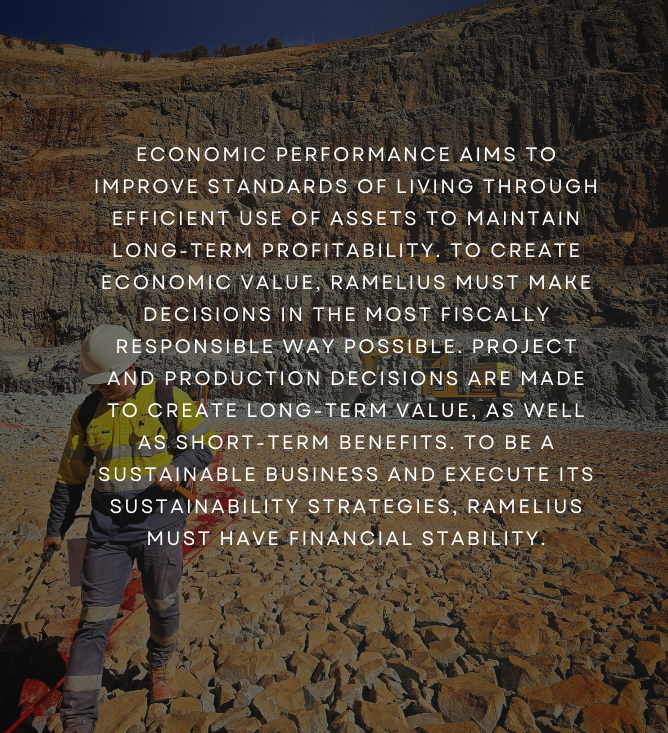
On a larger scale, Ramelius contribute to a sustainable economy that is strong and resilient, environmentally conscious and creates value for communities. Without strong economic performance, Ramelius would limit its capacity to provide jobs for local workforces, generate tax revenue to fund public services or support supplier businesses. The Company’s strategy aims to promote a sustainable economy that fosters economic development, local prosperity through goods and services, and through engagements within regions to generate jobs.
In terms of local workforce, Ramelius are transparent about its preference for local hiring, by encouraging local residents who reside within a reasonable drive-in / drive out distance from our operating sites to apply for vacancies.
Ramelius acknowledges the range of governance, social and environmental responsibilities to which it must adhere to ensure its business meets community and government expectations.
The Board is responsible for overseeing activities of the Company and monitoring compliance with legal and other regulatory requirements including accounting standards, continuous disclosure and ASX Listing Rules. The Managing Director is responsible for developing and implementing internal control and regulatory compliance policies and procedures.
Some of the key regulatory bodies and frameworks Ramelius report under include:
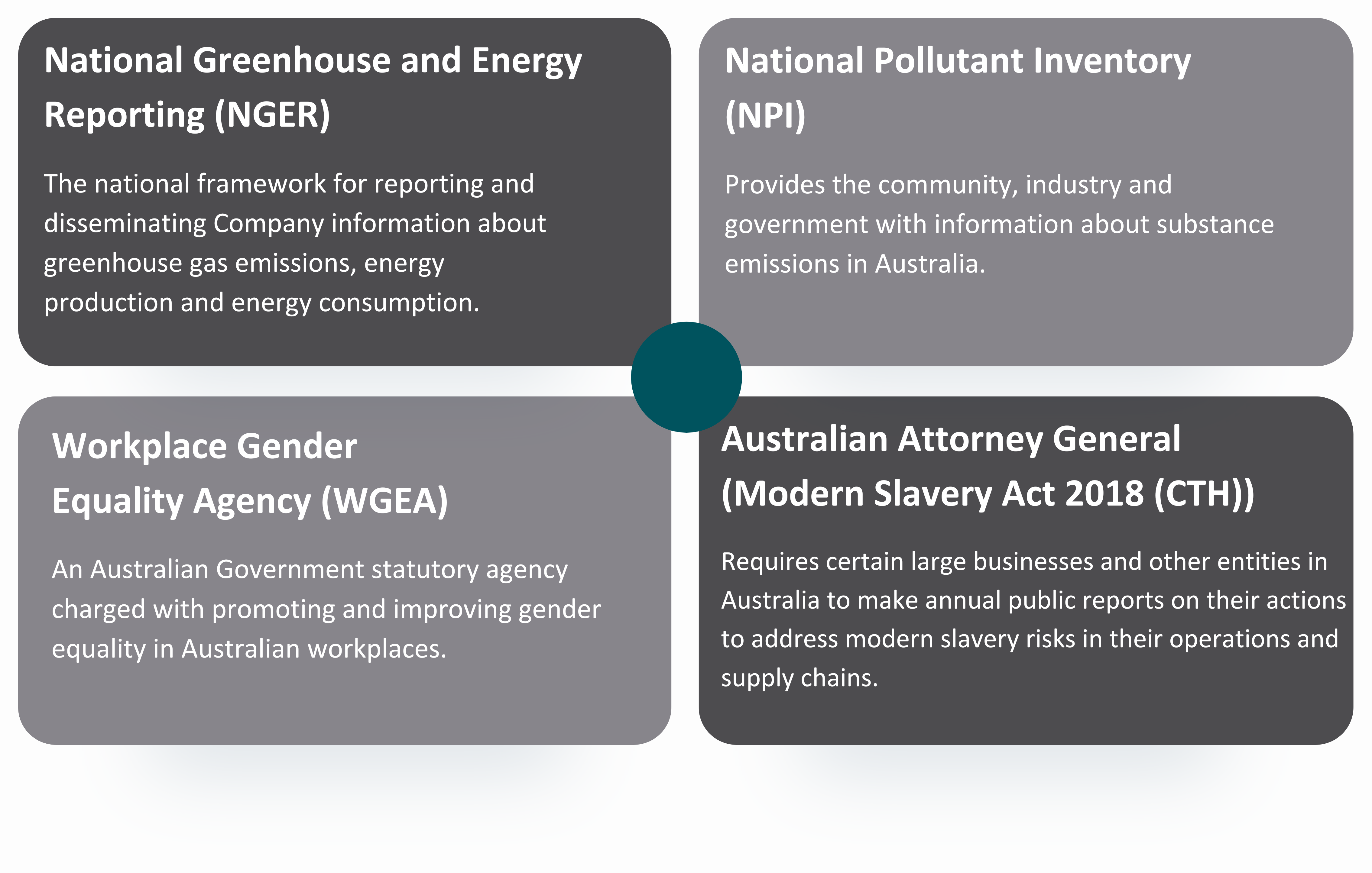
All Ramelius employees, including independent contractors who operate for or on behalf of Ramelius, are expected to uphold the standards outlined in the Code of Conduct Policy. As a condition of their engagement, this mandates that all employees and contractors uphold suitable standards of conduct, ethics, and integrity.
CODE OF CONDUCT POLICY EXPECTATIONS

The Anti-Bribery and Corruption Policy ensures that all employees behave honestly and follow the laws and ethical standards of the Company across all operations. Conduct that is unethical, dishonest, or corrupt is not permitted. To prevent, detect, and respond to acts that involve or could entail unethical practise such as bribery, and/or corruption, Ramelius are committed to mitigating risks and maintaining controls. Employees of Ramelius who are discovered to have committed an act of corruption or bribery shall face disciplinary action. The policy also ensures that Ramelius only conduct business with those who also engage in ethical and lawful practices.
The Voluntary Principles on Security and Human Rights (VPSHR) and the UN Guiding Principles on Business and Human Rights serve as guiding principles in ensuring that everyone has access to their basic freedoms and human rights. The Ramelius Modern Slavery and Human Rights Policy supports this commitment.
Due diligence in respect to human rights is carried out to guarantee Ramelius continues to monitor the effectiveness of its Modern Slavery and Human Rights Policy. Each year the Company issues its Modern Slavery Statement, which details the risk for the dangers of modern slavery in operations and supply networks as well as the steps needed to take to address these risks.
Forced work, human trafficking, child labour, and discrimination are some of the potential human rights risks that are examined during the Company’s due diligence procedure. Ramelius continue to review both existing and new activities to identify, prevent, and manage risks associated to modern slavery and human rights.
Click HERE to view our Anti-Bribery and Corruption Policy
Click HERE to view our Code of Conduct Policy
Click HERE to view our Modern Slavery & Human Rights Policy
WHISTLEBLOWING
To enable all directors, employees, potential employees, contractors, consultants, and external stakeholders to anonymously raise concerns, Ramelius has engaged an external whistleblower platform.
Company-wide training on the Company’s Whistleblower Policy and procedures are in place. The training strives to ensure that every employee is aware of the Whistleblower Policy and knows how to report any improper, unethical, or unlawful behaviour. This is in accordance with the extended legal rights and protections for whistleblowers provided by the Corporations Act 2001 (Cth).
Ramelius’ Incident Reporting and Investigation Procedure outlines the process involved in incident reporting and the investigation requirements for all incidents for Ramelius and its subsidiaries. This procedure aims to ensure all actions from incident reporting and investigations are captured and managed. This procedure is based on legislative, Company and site requirements.
Click HERE to view our Whistleblower Policy & Procedure
Risk management at Ramelius is overseen by the Board. All Board members are highly experienced in the oversight, management and mitigation of critical business risks. The Board, Audit and Risk & Sustainability Committees, and Executive Team regularly review the risk portfolio of the business and the effective management of risks.
The Ramelius risk and control framework, Ramelius Essentials, empowers its people to perform by ensuring that the Company does the fundamental things well. The Essentials Working Group (EWG) meets regularly, with risk management a standing agenda item. The Essentials Program focuses on integrating its approach to managing the fundamental requirements of the business which are to:
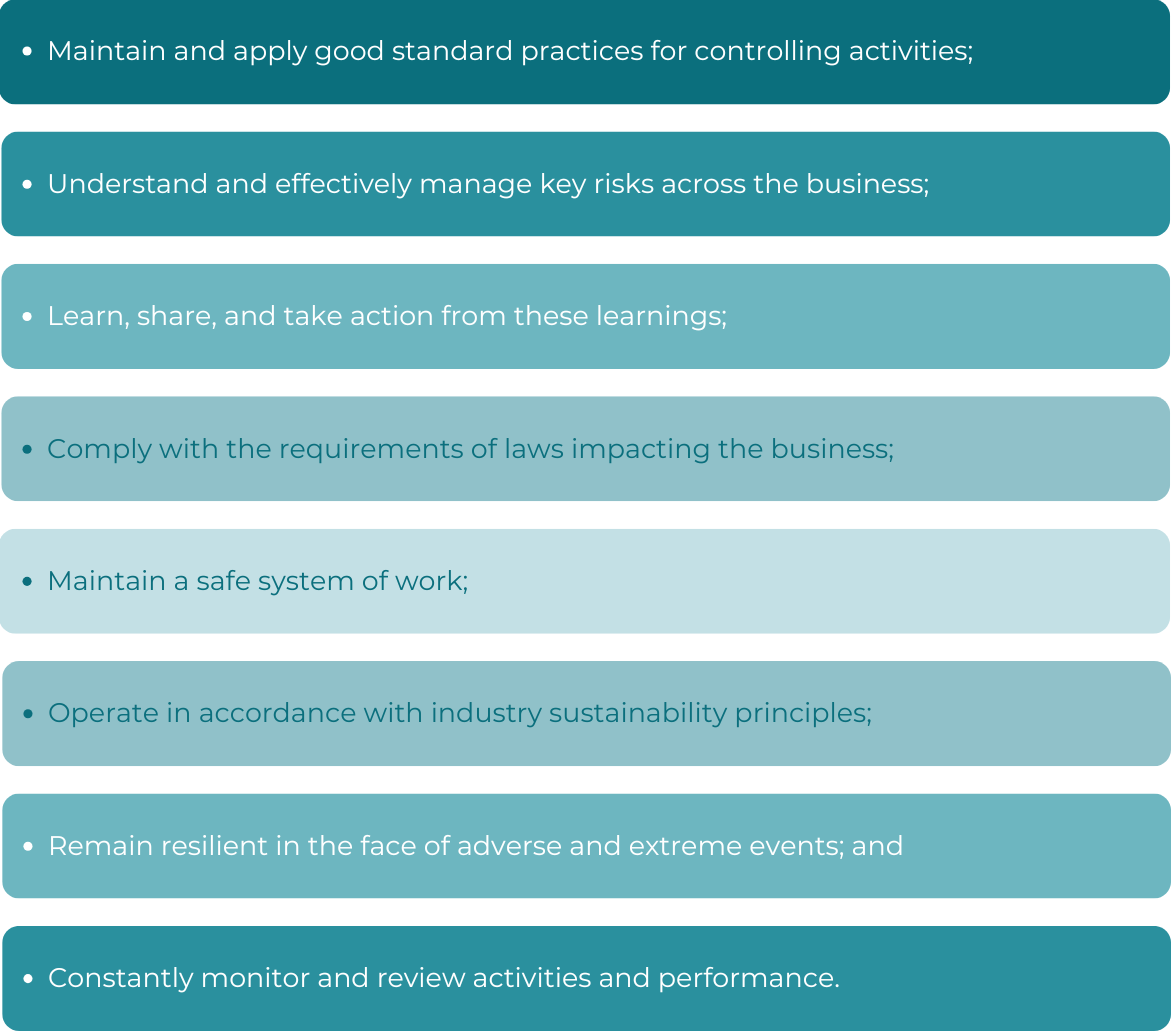
Risk registers are held for each Ramelius site as well as the corporate office and are managed by the respective work group with oversight provided by HSE Managers. A risk manager’s responsibility is to coordinate the development and maintenance of registers of material risks and opportunities. They must monitor and control improvement activities, as well as report to key stakeholders on material risks. Each risk register is formally reviewed and updated at least annually and is used in the budget planning process to prioritise expenditure in an effort to mitigate risk. Climate-related risks and relevant ESG risks and opportunities are also incorporated into the sustainability risk register.
The Lessons Learned Procedure helps Ramelius maintain compliance and adequate management of risks. Lessons Learned is simply knowledge and insight gained through experience, which when shared, improves corporate, project and operational capabilities and practices. To capture and communicate knowledge from lessons, a formal process is applied to identify and analyse positive and negative outcomes from an experience. This includes capturing what was done well or gaps, so that the Company can reduce the risk of repeating mistakes and increases its ability to repeat successes. An experience that is subject to lessons learned might be:

Click HERE to view our Risk & Sustainability Committee Charter
Click HERE to view our Risk Management Policy
Contractors and suppliers are a critical part of the Ramelius business and are relied upon to ensure that it can deliver on its strategy. Ramelius strives to support local suppliers where possible, and source goods and services from businesses in the communities in which it operates. This preference for local suppliers is embedded in the formal Purchase Order Standard Terms and Conditions.
Ramelius requires its suppliers to act in an ethical and responsible manner as a condition of conducting business together. This is enforced via the Company’s Purchase Order Standard Terms and Conditions and its Supplier Code of Conduct Standard which set out the minimum requirements expected from its suppliers. These conditions are also included in its contractual arrangements. Ramelius’ standard supplier contracts contain anti-corruption and modern slavery clauses, which require suppliers not to engage in conduct inconsistent with Australian and international laws and standards.
Ramelius assesses the potential for modern slavery risks within its supply chain by engaging with suppliers during the screening process. This formal and informal contact, which includes the completion of a specific modern slavery risk questionnaire by suppliers, allows the Company to consider all aspects of a supplier’s business and to identify matters that may need further attention or remediation. The questionnaire is designed to:
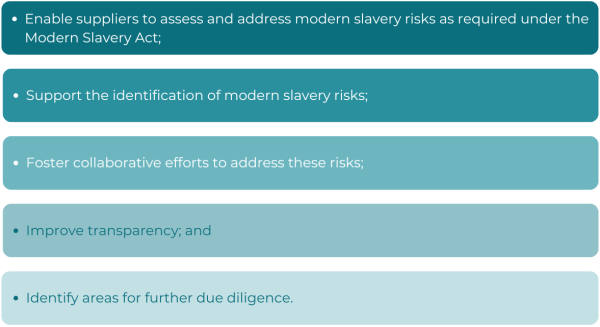
The potential for modern slavery at Ramelius is considered low as its offices, operations, and suppliers are predominantly Australian-based and therefore subject to a strong regulatory environment.
The most relevant risk areas within its supply chains with potential for modern slavery practices to exist are First Nations Peoples and remote communities in which the Company operates, procurement of certain goods and services (part of which may be sourced overseas), and labour conditions. All personnel, whether Ramelius or contractor-engaged, are subject to Australian employment law and undertake various induction, other training, and qualification programs. Ramelius are also guided by the UN Guiding Principles on Business and Human Rights.
Click HERE to view our Purchase Order Terms and Conditions
Click HERE to view our Supplier Code of Conduct Standard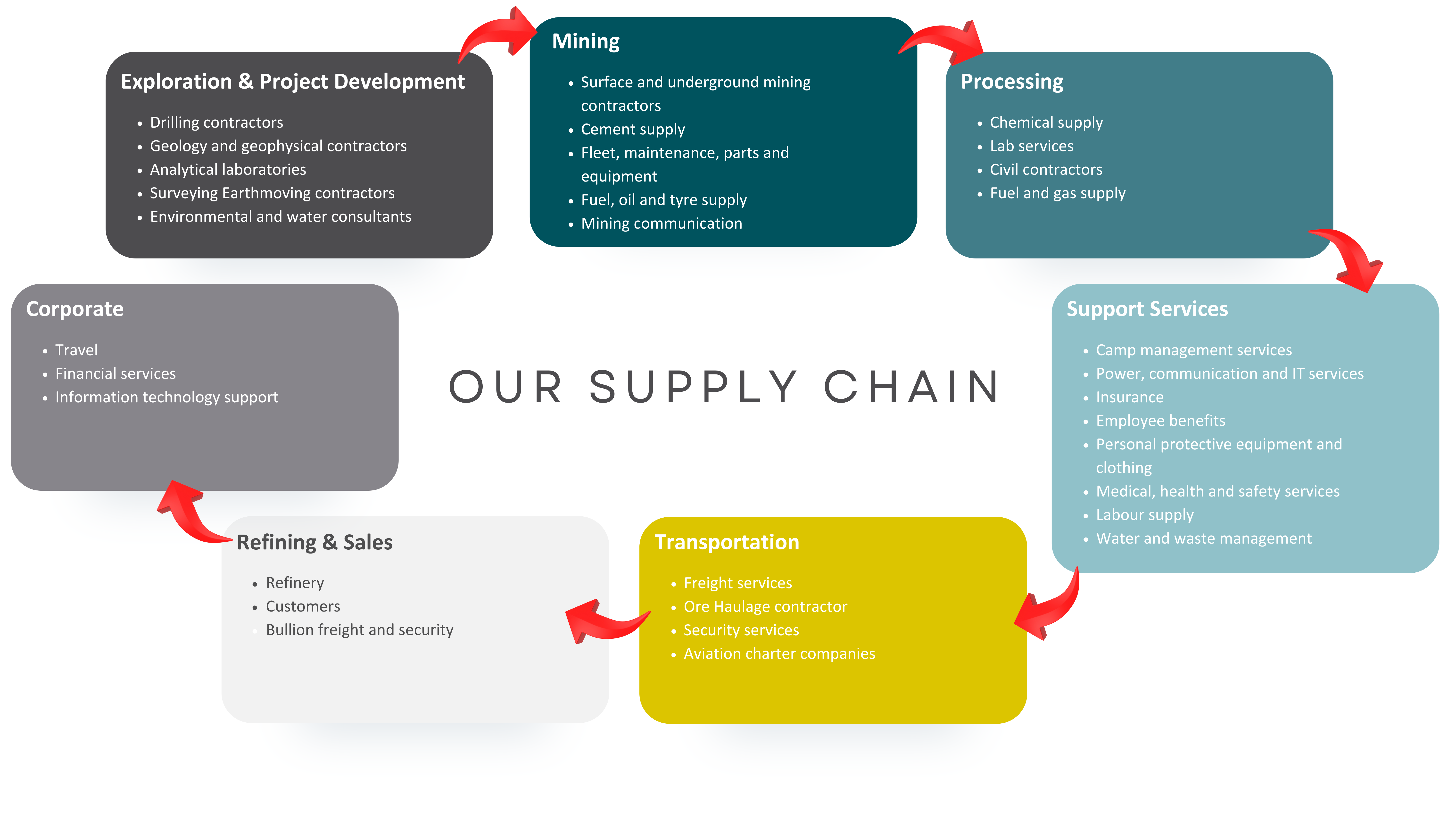
Information technology (IT) and cyber security are viewed as significant risks for Ramelius. Ramelius prioritises protection of the confidentiality, integrity and availability of business information and the systems and equipment on which information is stored. Ramelius holds responsibility to manage increasing external threats to information integrity and the risk of internal release or misuse, either deliberate or accidental. These commitments are outlined within the Ramelius Information Security Policy. IT security matters are overseen by the Board and Audit Committee.
Cyber incidents occur when there is a breach that requires corrective action because it threatens the confidentiality, availability and integrity of an information system or the information a system processes, stores or transmits. To support mitigation efforts, Ramelius has a series of measures and procedures that will protect the organisation from cyber-attacks and IT system interruptions. This includes the IT Cyber Security Response Procedure.
The IT Cyber Security Response Procedure serves to:

Ramelius currently utilise platforms to protect data, information, and technology assets from sophisticated attackers, by detecting, investigating, and responding to cyber threats in real-time. Ramelius also conducts a number of initiatives to prevent incidents from occurring. These include:
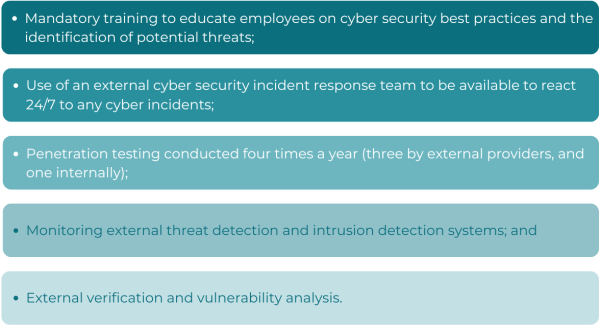
Innovation is an important component of the Ramelius business and a driver for resource efficiency, productivity improvement and competitive advantage.
Ramelius recognises the importance of strategic engagements to generate innovative ways to capture economic, environmental and social value and are committed to collaborative research and development.
Ramelius continues to support innovative research into mineral exploration being undertaken by Australia’s national science agency the Commonwealth Scientific and Industrial Research Organisation (CSIRO). More information on collaboration with the CSIRO can be found within the Company’s annual Sustainability Reports.

